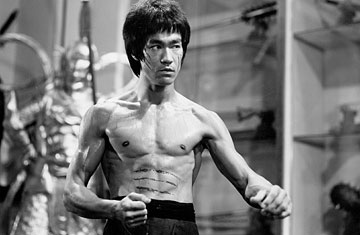
Bruce Lee
He was born in San Francisco, but Bruce Lee is the ultimate hometown hero to the people of Hong Kong. The martial arts movie star was one of the first Chinese celebrities to achieve an international following, putting Hong Kong's film industry on the map in the early 1970s with kung fu classics like Fist of Fury and Way of the Dragon. His grace, brashness and fame gave Hong Kong residents a superstar who was one of their own.
Now, Hong Kong may have found a proper way to remember him. This week, the city's government agreed to restore Lee's former residence in Hong Kong's Kowloon Tong district, with an eye toward turning it into a tourist attraction. Just as Elvis fans have Graceland, martial-arts fans will be able to make the pilgrimage to 41 Cumberland Road — Lee's last residence before his death in 1973 at age 32 — and visit the gym where he practiced, view his library of books on martial arts, philosophy and ballet, and bear witness to other kung fu curiosities. "As Bruce Lee fans we wanted to preserve the last place where Bruce Lee lived," says Peer Hesstvedt, who last year started a Facebook page to lobby for saving the home. "People should know what an incredible impact he had on so many people." (Watch the video of TIME's favorite Chinese movies.)
The agreement by the city to develop the rather unprepossessing, 5,700 sq. ft. home — Lee called it the Crane's Nest — rescues the two-story property from ignoble obscurity. It has been operating as a "love motel" catering to amorous couples looking to rent a room for an hour for a romantic tryst. Last year, the home's owner, Chinese real estate tycoon and philanthropist Yu Panglin, announced plans to sell it for up to $13 million so he could donate the proceeds to victims of the Sichuan earthquake. But that caused an uproar among Bruce Lee fans, who feared a new owner would bring in the wrecking balls.
After a vigorous preservation campaign by Lee's followers, Yu ultimately agreed to donate the home to Hong Kong if the government promised to turn it into a museum. On Jan. 6 Hong Kong's Commerce and Economic Bureau agreed to restore it to the same state as when the Lee lived there. A few obstacles remain. Yu said he will not hand it over until he sees and agrees to a comprehensive plan. Some are calling for a moviehouse and martial arts center to be added to the site to entice more tourists. But fans were generally satisfied. "I was very happy because I think they went with the original plan ... to preserve the house in the original state," says Hesstvedt. "I think that would do justice and be in the right spirit of Bruce Lee."
There are other Bruce Lee museums. One is in California, where he was born, and another is in his ancestral province in Guangdong, China. There are plans for yet another in Seattle, where Lee also lived. But Lee spent most of his childhood in Hong Kong, filmed his most famous movies there and eventually died in the Hong Kong home of his rumored mistress, Taiwanese actress Betty Ting Pei, from a reaction to a pain reliever. So it's fitting he be immortalized there, fans say. "In every corner of the globe, people recognize the existence of Hong Kong movies because of Bruce Lee," says Wong Yiu Keung. Now Hong Kong is returning the favor by preserving his memory.
